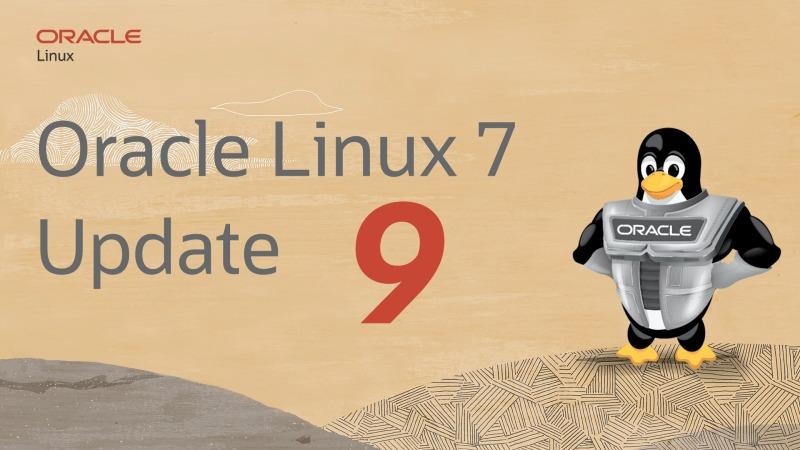Simon Coter has announced the release of Oracle Linux 7 Update 9.
Oracle is pleased to announce the general availability of Oracle Linux 7 Update 9, which includes Unbreakable Enterprise Kernel (UEK) Release 6 as the default kernel. Oracle Linux brings the latest open source innovations and business-critical performance and security optimizations for cloud and on-premises deployment. Oracle Linux maintains user space compatibility with Red Hat Enterprise Linux (RHEL), which is independent of the kernel version that underlies the operating system. Existing applications in user space will continue to run unmodified on Oracle Linux 7 Update 9 with UEK release 6 and no re-certifications are needed for applications already certified with Red Hat Enterprise Linux 7 or Oracle Linux 7.
Oracle Linux 7 Update 9 is available on 64-bit Arm (aarch64) and 64-bit AMD/Intel (x86-64) based systems. Oracle Linux 7 Update 9 ships with the following kernel packages, which include bug fixes, security fixes, and enhancements:
- UEK Release 6 (kernel-uek-5.4.17-2011.6.2.el7uek) for x86-64 and aarch64
- Red Hat Compatible Kernel (RHCK) (kernel-3.10.0-1136.el7) for x86-64 only
Notable new features
- New features and changes for Red Hat Compatible Kernel (RHCK)
- EDAC driver for Intel ICX systems added: The Error Detection and Correction (EDAC) driver has been added to Intel ICX systems in this release. This driver enables error detection on these systems, as well as reports any errors to the EDAC subsystem.
- Mellanox ConnectX-6 Dx network adapter support added: Oracle Linux 7 Update 9 adds the PCI IDs of the Mellanox ConnectX-6 Dx network adapter to the mlx5_core driver.
- UEK Release 6 is based on the mainline Linux kernel 5.4, supplying more innovation than other commercial Linux kernels.
- Arm: Enhanced support for the Arm (aarch64) platform, including improvements in the areas of security and virtualization.
- Cgroup v2: UEK R6 includes all Cgroup v2 features, along with several enhancements.
- ktask: ktask is a framework for parallelizing CPU-intensive work in the kernel. It can be used to speed up large tasks on systems with available CPU power, where a task is single-threaded in user space.
- Parallelized kswapd: Page replacement is handled in the kernel asynchronously by kswapd, and synchronously by direct reclaim. When free pages within the zone free list are low, kswapd scans pages to determine if there are unused pages that can be evicted to free up space for new pages. This optimization improves performance by avoiding direct reclaims, which can be resource intensive and time consuming.
- Kexec firmware signing: The option to check and validate a kernel image signature is enabled in UEK R6. When kexec is used to load a kernel from within UEK R6, kernel image signature checking and validation can be implemented to ensure that a system only loads a signed and validate kernel image.
- Memory management: Several performance enhancements have been implemented in the kernel's memory management code to improve the efficiency of clearing pages and cache, as well as enhancements to fault management and reporting.
- NVDIMM: NVDIMM feature updates have been implemented so that persistent memory can be used as traditional RAM.
- NVMe: NVMe improvements include: NVMe over Fabrics TCP host and the target drivers have been added, multipath support and passthrough command support have been added. NVMe namespace support is extended to include Namespace Write Protect and Asynchronous Namespace Access.
- DTrace: DTrace support is enabled and has been re-implemented to use the Berkeley Packet Filter (BPF) that is integrated into the Linux kernel.
- OCFS2: Support for the OCFS2 file system is enabled.
- Btrfs: Support for the Btrfs file system is enabled and support to select Btrfs as a file system type when formatting devices is available.
- NFS: enhancements and new features that help on NFS performance.
- Zero copy networking: network performance enhancements and new technology to build faster networking products.
- New features and changes are independent of the kernels
- DIF/DIX (T10 P1) support for specific hardware: SCSI T10 DIF/DIX is fully supported on hardware that has been qualified by the vendor, provided that the vendor also fully supports the particular host bus adapter (HBA) and storage array configuration.
- FreeRDP updated to version 2.1.1: The FreeRDP feature for the Remote Desktop Protocol (RDP) is updated from version 2.0.0 to version 2.1.1 in this release. This version of FreeRDP includes new RDP options for the current Microsoft Windows terminal server version. Several security issues are also fixed in FreeRDP 2.1.1.
- Pacemaker updated to version 1.1.23: The Pacemaker cluster resource manager is updated in this release to version 1.1.23. This version of Pacemaker provides numerous bug fixes over the previous version.
Further information is available in the Release Notes for Oracle Linux 7 Update 9.
Announcing the release of Oracle Linux 7 Update 9

